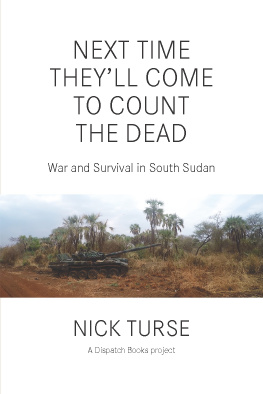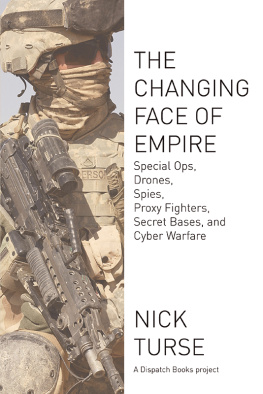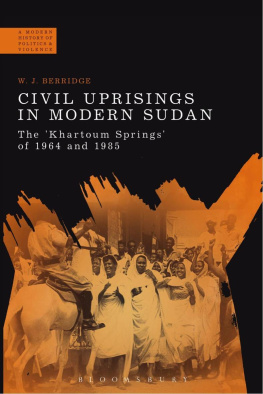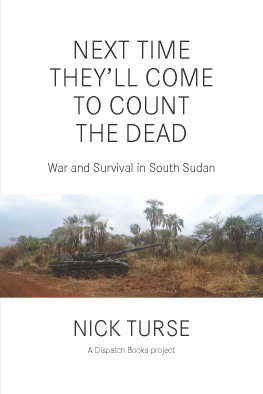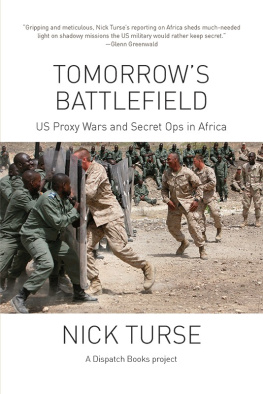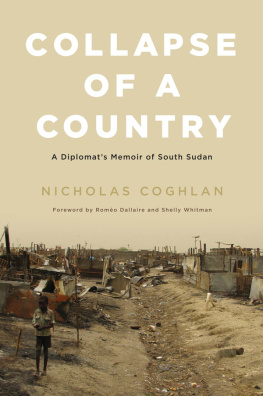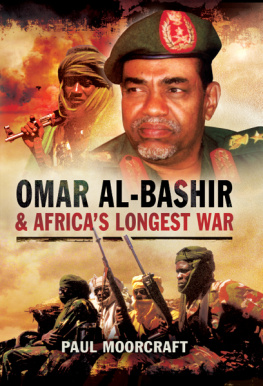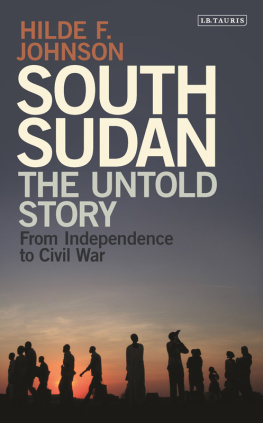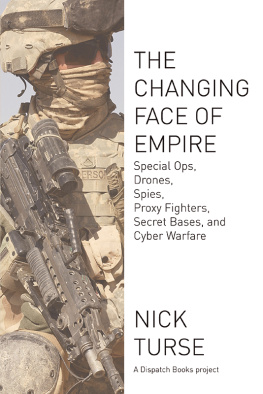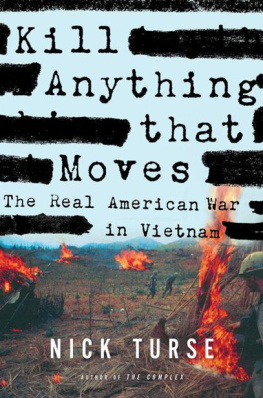Contents
A More Personal War
Their voices, sharp and angry, shook me from my slumber. I didnt know the language, but I instantly knew the translation. So I groped for the opening in the mosquito net, shuffled from my downy white bed to the window, threw back the stained tan curtain, and squinted into the light of a new day breaking in South Sudan. Below, in front of my guest house, one man was getting his ass kicked by another. A flurry of blows connected with his face and suddenly he was crumpled on the ground. Three or four men were watching.
The victor, still standing, appeared strong and confident. His sinewy arms seemed to have been carved from obsidian. Having won in decisive fashion, he turned his back and began walking away with a self-satisfied swagger. The other man staggered to his feet, his face contorted with a ragged, wounded-animal lookthe one that seems to begin as an electric ache at the back of your jaw, drawing your lips back into a grimace as tears well up in your eyes. And what he did next seemed straight out of a movie. I couldnt believe I was seeing it.
The vast, rutted dirt field below me was filled with trash: half-burned water bottles, empty soda cansand glass. And that furious man promptly did what I had previously only seen on screen. He grabbed a bottle by the neckit might already have been broken or he might have shattered off the bottom with a quick rap on a rockand in an instant he had himself an equalizer.
The ass-kicker spun around to find the tables turned and he knew it. The man with the bottle knew it, too. He was shouting and jabbing, though he wasnt actually close enough to do any damage. Nonetheless, with fear spreading across his face, the ass-kicker backpedaled, still talking loud but unmistakably in retreat.
It seemed clear enough that the man with the bottle didnt really have it in him to punch that jagged glass through the others taut skin. His fury seemed to fade fast and he didnt press his advantage. Or maybe he was just afraid of what might happen if he were disarmed. Whatever the reason, cooler heads prevailed. The onlookers got him to drop his weapon and the combatants walked off in opposite directions. It was over, even if nothing else was in South Sudan.
At one point, as the two fought, I glanced back at the bed where my cell phone lay and nearly fetched it. The impulse to shoot a few pictures or some video footage of the unfolding scene was powerful and hardly surprising since I come from a culture now built around documenting and sharing even the most mundane happenings.
I didnt move, in part because I had no idea what was going on. If I recorded it, what then? What accompanying story could I tell? I knew that, short of one man killing the other, it was unlikely that anyone would be around by the time I threw on my clothes and got downstairs. Real-life fights rarely last long. And what, even if they spoke English, were these men going to tell me? Would I write about a personal skirmish over money or a woman or some drunken insult?
Thinking about it later, I came to see the episode as a metaphor for my situation. It was the summer of 2014 and the dawn of my first full day on my initial trip to South Sudan. I was there to get an on-the-ground look at a failing nation in the midst of a months-old civil war; a complex, partly tribal conflict that, in some ways, boiled down to a backyard fight between two men. And frankly, as with the morning struggle I had just witnessed, I had little idea of what was going on. Sure, Id talked to humanitarian experts and South Sudanese in the United States. Id read news articles and substantive reports by the United Nations, Human Rights Watch, and others. On the flight over, Id finished a very good book on the country and a couple marginally useful ones before that, but I couldnt have been more of a neophyte standing there in the capital of a new nation, convulsed by a conflict that had already killed more than 10,000 people and left millions homeless or displaced.
Still, I came with a history that seemed suited to the situation. Id spent parts of the previous decade wandering around post-conflict countries in Southeast Asia, unearthing evidence of horrendous crimes committed by the United States and its allies. I had traveled to remote Vietnamese villages no American had visited since my countrys combat there ended in 1973, hamlets where the villagers might never have met an unarmed Westerner. I talked to people about rapes and murders and massacres, largely by American troops. I interviewed them about living for years under bombs and artillery shells and helicopter gunships that hunted humans from the sky. I spoke with women and men who saw their families cut down by American teenagers with automatic rifles. I talked with those who had lost limbs or eyes or were scorched by napalm or white phosphorousincendiary weapons that melted faces or left the victims with imperfectly mended swaths of skin. And back in the United States, I spent endless hours with the men who had done these sorts of things to Vietnamese and Cambodians, as well as others who had refused to take part.
After more than 10 years immersed in atrocity, I needed a change soobviouslyI headed for a war zone filled with atrocities about which I knew next to nothing. But to me, it felt different. I wasnt about to repeat my work in Vietnam. I had landed in a place where history was being made and I was going to do my best to report on a different kind of war victim. This time, it was going to be displaced people trapped by the thousands on United Nations bases that had become almost like open-air prisons. It didnt take me long, of course, to realize that there was something unnervingly familiar about the work, about the grim tales I began to hear of suffering, privation, and loss (with women and children, as always, hit hardest). In talking to people in those sun-drenched limbosrefugees in their own countryit took next to no time for stories I recognized well to begin seeping into the interviews, tales of family members gunned down in the streets, of rapes and assaults, the sort of hideous acts that form the fabric of modern war, no matter what country, what area of the world.
I spent a couple weeks in-country talking to ordinary South Sudanese and humanitarian workers, taking stock as best I couldpart of the time on the outskirts of Malakal, a war-ravaged town 515 kilometers north of Juba.
I traveled there, in the heart of the rainy season, to find a United Nations base drowning in a sea of muck and squalor. And I wiled away an evening with a couple of local journalists who had, in the wake of the war, signed on with the U.N. Bathed in an unnatural fluorescent glow, we talked shop after hours in their office. I wanted the inside story of South Sudans crisis and they, in turn, wanted to know about me. Perhaps unsatisfied with my answers, one of them decided to consult Google for background. My book on the Vietnam War, Kill Anything That Moves , popped up instantly and he looked up from his monitor astonished. He had, after all, just told me about how a member of his familya man of some standinghad apparently been the victim of a targeted killing in the opening salvo of the civil war. If I specialized in investigating crimes of war, the journalist wanted to know, why the hell wasnt I investigating war crimes in South Sudan? I came up with excuses, but my new acquaintance found them unconvincing and, in truth, I wasnt that convinced myself.
I spent that night on a cot in the back of a deserted office on that U.N. base thinking about what he had said and was still thinking about it the next day when I arrived at a nearby airport to catch a U.N. flight back to Juba. Of course, to call it an airport is a bit of a misnomer. By the time I arrived, it had devolved into an airstrip. Nobody seemed to use its vintage blue and white terminal building anymore. Instead, you drove past cold-eyed Rwandan peacekeepers, U.N. troop trucks, and an armored personnel carrier or two, right up to the tarmac.

